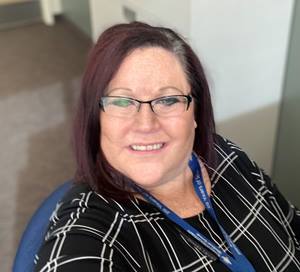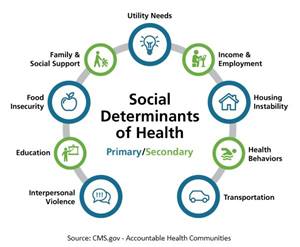
A patient who didn’t have heat in his home received help thanks to persistence and advocacy from care manager Melanie Turner, RN. Melanie supports Layton Clinic providers on behalf of Castell, using “reimagined primary care,” a value-based care model that’s focused on keeping care more affordable and accessible.

Melanie Turner, RN
Care managers like Melanie help patients with complex needs get the support they need to live a healthier life. Melanie says they often need community resources related to the social determinants of health—nonmedical factors that affect people’s health, such as lack of transportation or housing instability. Melanie says, “These patients have barriers and unmet needs that keep them from living the healthiest lives possible.”
Melanie initially thought the patient had been without heat in his home for a few weeks. As she investigated further, however, she realized the situation was even more dire.
“This patient is cognitively delayed and while he functions pretty well and understands things like his medication and diagnosis, he’d been left in a situation that he simply couldn’t navigate,” she says. “This wasn’t just a matter of providing him community resources and phone numbers. He couldn’t navigate all the steps on his own. He needed someone to step in and help.”
Soon Melanie learned this patient had been without heat for not two weeks, but two years. “His house needed multiple repairs that were all tied together,” she says. “For two years he’d used a couple of space heaters and only spent time in a few rooms.”
Melanie says since the patient didn’t have heat, his siblings, who’d been living in a skilled nursing facility, weren’t allowed to be discharged to live with him, so he was alone.
Melanie touched base with the patient every day for the next two weeks. She helped him gather paperwork, headed conference calls with him and others, explained in detail everything he needed to know and provide, and eventually helped him get approved for a grant for home repairs.
“That’s about when we found out his furnace problems were tied to electrical problems and needing a roof repaired,” she says. “I helped with arranging for bids from contractors and eventually getting contracts for him to sign.”
Melanie also learned the patient’s home needed a lot of clean up to be inhabitable for his siblings. “Through this process I’d become aware of his home environment and we’ve been working on meeting those needs as well,” she says.
“It was a lot of work,” says Melanie. “But just seeing the look on his face that someone cared is such a reward. This gentleman is such a sweet person. When he realized that someone actually cared, including our entire clinic, it made him feel like a million bucks.”
Melanie’s team of north area care managers have been working with Castell since November, which has helped them connect regularly and share resources.
“We all support each other and work as a team,” Melanie says. “So, the next time a care manager runs into a similar challenge, we’re not reinventing the wheel. For example, when I learned about this home repair grant, I was able to share it with my colleagues.”
Tiffany Jones, RN, manager for ambulatory care management, says, “Melanie is an incredible resource not only for her patients, but also for her peers. If a care manager is struggling to find a resource for a patient, they often reach out to Melanie. If she doesn’t know the answer, she’ll dig and find it. Melanie is always willing to go the extra mile to reduce or remove a patient’s barrier. Although she’s relatively new to Layton Clinic, she’s not new to care management. Her caring nature, experience, and critical thinking skills are really a gift to the population she serves.”
“Melanie and nurse care managers like her within Intermountain play a crucial role in the broader picture of health and overall wellbeing for patients,” adds Kevin Steele, senior practice manager at Layton Clinic. “The needs of these patients are often complex, and this team walks them through challenging obstacles, advocating for them every step of the way.”

How can other caregivers help these patients? Intermountain is focused on addressing social factors that influence people’s health, such as access to food, housing, and transportation. If you encounter a patient who needs help with these social determinants of health, you can encourage them to contact Utah 211 at 211utah.org or by calling 211. Utah 211 is a statewide service that connect Utahns with a wide range of services in their community, including food, housing, transportation, and employment. SelectHealth and some other insurers also have advocates who can help members find resources. And you can refer patients in need to Intermountain’s care management team.

